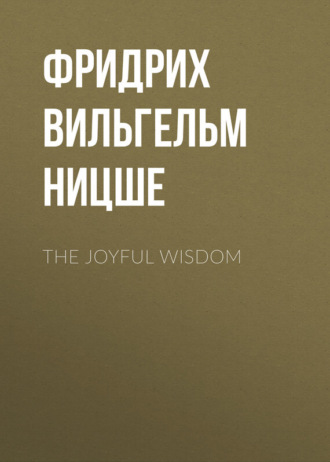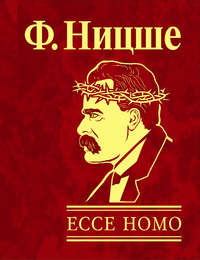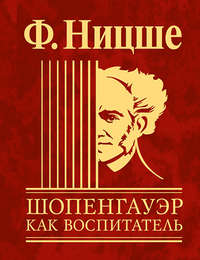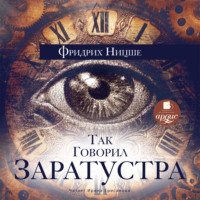 полная версия
полная версияThe Joyful Wisdom
"And once more Grow Clear."– We, the generous and rich in spirit, who stand at the sides of the streets like open fountains and would hinder no one from drinking from us: we do not know, alas! how to defend ourselves when we should like to do so; we have no means of preventing ourselves being made turbid and dark, – we have no means of preventing the age in which we live casting its "up-to-date rubbish" into us, or of hindering filthy birds throwing their excrement, the boys their trash, and fatigued resting travellers their misery, great and small, into us. But we do as we have always done: we take whatever is cast into us down into our depths – for we are deep, we do not forget —and once more grow clear…
379The Fool's Interruption.– It is not a misanthrope who has written this book: the hatred of men costs too dear to-day. To hate as they formerly hated man, in the fashion of Timon, completely, without qualification, with all the heart, from the pure love of hatred – for that purpose one would have to renounce contempt: – and how much refined pleasure, how much patience, how much benevolence even, do we owe to contempt! Moreover we are thereby the "elect of God": refined contempt is our taste and privilege, our art, our virtue perhaps, we, the most modern amongst the moderns!.. Hatred, on the contrary, makes equal, it puts men face to face, in hatred there is honour; finally, in hatred there is fear, quite a large amount of fear. We fearless ones, however, we, the most intellectual men of the period, know our advantage well enough to live without fear as the most intellectual persons of this age. People will not easily behead us, shut us up, or banish us; they will not even ban or burn our books. The age loves intellect, it loves us, and needs us, even when we have to give it to understand that we are artists in despising; that all intercourse with men is something of a horror to us; that with all our gentleness, patience, humanity and courteousness, we cannot persuade our nose to abandon its prejudice against the proximity of man; that we love nature the more, the less humanly things are done by her, and that we love art when it is the flight of the artist from man, or the raillery of the artist at man, or the raillery of the artist at himself…
380"The Wanderer" Speaks.– In order for once to get a glimpse of our European morality from a distance, in order to compare it with other earlier or future moralities, one must do as the traveller who wants to know the height of the towers of a city: for that purpose he leaves the city. "Thoughts concerning moral prejudices," if they are not to be prejudices concerning prejudices, presuppose a position outside of morality, some sort of world beyond good and evil, to which one must ascend, climb, or fly – and in the given case at any rate, a position beyond our good and evil, an emancipation from all "Europe," understood as a sum of inviolable valuations which have become part and parcel of our flesh and blood. That one does want to get outside, or aloft, is perhaps a sort of madness, a peculiar, unreasonable "thou must" – for even we thinkers have our idiosyncrasies of "unfree will" – : the question is whether one can really get there. That may depend on manifold conditions: in the main it is a question of how light or how heavy we are, the problem of our "specific gravity." One must be very light in order to impel one's will to knowledge to such a distance, and as it were beyond one's age, in order to create eyes for oneself for the survey of millenniums, and a pure heaven in these eyes besides! One must have freed oneself from many things by which we Europeans of to-day are oppressed, hindered, held down, and made heavy. The man of such a "Beyond," who wants to get even in sight of the highest standards of worth of his age, must first of all "surmount" this age in himself – it is the test of his power – and consequently not only his age, but also his past aversion and opposition to his age, his suffering caused by his age, his unseasonableness, his Romanticism…
381The Question of Intelligibility.– One not only wants to be understood when one writes, but also – quite as certainly —not to be understood. It is by no means an objection to a book when someone finds it unintelligible: perhaps this might just have been the intention of its author, – perhaps he did not want to be understood by "anyone." A distinguished intellect and taste, when it wants to communicate its thoughts, always selects its hearers; by selecting them, it at the same time closes its barriers against "the others." It is there that all the more refined laws of style have their origin: they at the same time keep off, they create distance, they prevent "access" (intelligibility, as we have said,) – while they open the ears of those who are acoustically related to them. And to say it between ourselves and with reference to my own case, – I do not desire that either my ignorance, or the vivacity of my temperament, should prevent me being understood by you, my friends: I certainly do not desire that my vivacity should have that effect, however much it may impel me to arrive quickly at an object, in order to arrive at it at all. For I think it is best to do with profound problems as with a cold bath – quickly in, quickly out. That one does not thereby get into the depths, that one does not get deep enough down– is a superstition of the hydrophobic, the enemies of cold water; they speak without experience. Oh! the great cold makes one quick! – And let me ask by the way: Is it a fact that a thing has been misunderstood and unrecognised when it has only been touched upon in passing, glanced at, flashed at? Must one absolutely sit upon it in the first place? Must one have brooded on it as on an egg? Diu noctuque incubando, as Newton said of himself? At least there are truths of a peculiar shyness and ticklishness which one can only get hold of suddenly, and in no other way, – which one must either take by surprise, or leave alone… Finally, my brevity has still another value: on those questions which pre-occupy me, I must say a great deal briefly, in order that it may be heard yet more briefly. For as immoralist, one has to take care lest one ruins innocence, I mean the asses and old maids of both sexes, who get nothing from life but their innocence; moreover my writings are meant to fill them with enthusiasm, to elevate them, to encourage them in virtue. I should be at a loss to know of anything more amusing than to see enthusiastic old asses and maids moved by the sweet feelings of virtue: and "that have I seen" – spake Zarathustra. So much with respect to brevity; the matter stands worse as regards my ignorance, of which I make no secret to myself. There are hours in which I am ashamed of it; to be sure there are likewise hours in which I am ashamed of this shame. Perhaps we philosophers, all of us, are badly placed at present with regard to knowledge: science is growing, the most learned of us are on the point of discovering that we know too little. But it would be worse still if it were otherwise, – if we knew too much; our duty is and remains first of all, not to get into confusion about ourselves. We are different from the learned; although it cannot be denied that amongst other things we are also learned. We have different needs, a different growth, a different digestion: we need more, we need also less. There is no formula as to how much an intellect needs for its nourishment; if, however, its taste be in the direction of independence, rapid coming and going, travelling, and perhaps adventure for which only the swiftest are qualified, it prefers rather to live free on poor fare, than to be unfree and plethoric. Not fat, but the greatest suppleness and power is what a good dancer wishes from his nourishment, – and I know not what the spirit of a philosopher would like better than to be a good dancer. For the dance is his ideal, and also his art, in the end likewise his sole piety, his "divine service."…
382Great Healthiness.– We, the new, the nameless, the hard-to-understand, we firstlings of a yet untried future – we require for a new end also a new means, namely, a new healthiness, stronger, sharper, tougher, bolder and merrier than any healthiness hitherto. He whose soul longs to experience the whole range of hitherto recognised values and desirabilities, and to circumnavigate all the coasts of this ideal "Mediterranean Sea," who, from the adventures of his most personal experience, wants to know how it feels to be a conqueror and discoverer of the ideal – as likewise how it is with the artist, the saint, the legislator, the sage, the scholar, the devotee, the prophet, and the godly Nonconformist of the old style: – requires one thing above all for that purpose, great healthiness —such healthiness as one not only possesses, but also constantly acquires and must acquire, because one continually sacrifices it again, and must sacrifice it! – And now, after having been long on the way in this fashion, we Argonauts of the ideal, who are more courageous perhaps than prudent, and often enough shipwrecked and brought to grief, nevertheless, as said above, healthier than people would like to admit, dangerously healthy, always healthy again, – it would seem, as if in recompense for it all, that we have a still undiscovered country before us, the boundaries of which no one has yet seen, a beyond to all countries and corners of the ideal known hitherto, a world so over-rich in the beautiful, the strange, the questionable, the frightful, and the divine, that our curiosity as well as our thirst for possession thereof, have got out of hand – alas! that nothing will now any longer satisfy us! How could we still be content with the man of the present day after such peeps, and with such a craving in our conscience and consciousness? What a pity; but it is unavoidable that we should look on the worthiest aims and hopes of the man of the present day with ill-concealed amusement, and perhaps should no longer look at them. Another ideal runs on before us, a strange, tempting ideal, full of danger, to which we should not like to persuade any one, because we do not so readily acknowledge any one's right thereto: the ideal of a spirit who plays naïvely (that is to say involuntarily and from overflowing abundance and power) with everything that has hitherto been called holy, good, inviolable, divine; to whom the loftiest conception which the people have reasonably made their measure of value, would already imply danger, ruin, abasement, or at least relaxation, blindness, or temporary self-forgetfulness; the ideal of a humanly superhuman welfare and benevolence, which may often enough appear inhuman, for example, when put by the side of all past seriousness on earth, and in comparison with all past solemnities in bearing, word, tone, look, morality and pursuit, as their truest involuntary parody, – but with which, nevertheless, perhaps the great seriousness only commences, the proper interrogation mark is set up, the fate of the soul changes, the hour-hand moves, and tragedy begins…
383Epilogue.– But while I slowly, slowly finish the painting of this sombre interrogation-mark, and am still inclined to remind my readers of the virtues of right reading – oh, what forgotten and unknown virtues – it comes to pass that the wickedest, merriest, gnome-like laughter resounds around me: the spirits of my book themselves pounce upon me, pull me by the ears, and call me to order. "We cannot endure it any longer," they shout to me, "away, away with this raven-black music. Is it not clear morning round about us? And green, soft ground and turf, the domain of the dance? Was there ever a better hour in which to be joyful? Who will sing us a song, a morning song, so sunny, so light and so fledged that it will not scare the tantrums, – but will rather invite them to take part in the singing and dancing. And better a simple rustic bagpipe than such weird sounds, such toad-croakings, grave-voices and marmot-pipings, with which you have hitherto regaled us in your wilderness, Mr Anchorite and Musician of the Future! No! Not such tones! But let us strike up something more agreeable and more joyful!" – You would like to have it so, my impatient friends? Well! Who would not willingly accede to your wishes? My bagpipe is waiting, and my voice also – it may sound a little hoarse; take it as it is! don't forget we are in the mountains! But what you will hear is at least new; and if you do not understand it, if you misunderstand the minstrel, what does it matter! That – has always been "The Minstrel's Curse."14 So much the more distinctly can you hear his music and melody, so much the better also can you – dance to his piping. Would you like to do that?..
APPENDIX
SONGS OF PRINCE FREE-AS-A-BIRD
TO GOETHE.15"The Undecaying"Is but thy label,God the betrayingIs poets' fable.Our aims all are thwartedBy the World-wheel's blind roll:"Doom," says the downhearted,"Sport," says the fool.The World-sport, all-ruling,Mingles false with true:The Eternally FoolingMakes us play, too!THE POET'S CALLAs 'neath a shady tree I satAfter long toil to take my pleasure,I heard a tapping "pit-a-pat"Beat prettily in rhythmic measure.Tho' first I scowled, my face set hard,The sound at length my sense entrappingForced me to speak like any bard,And keep true time unto the tapping.As I made verses, never stopping,Each syllable the bird went after,Keeping in time with dainty hopping!I burst into unmeasured laughter!What, you a poet? You a poet?Can your brains truly so addled be?"Yes, yes, good sir, you are a poet,"Chirped out the pecker, mocking me.What doth me to these woods entice?The chance to give some thief a trouncing?A saw, an image? Ha, in a triceMy rhyme is on it, swiftly pouncing!All things that creep or crawl the poetWeaves in his word-loom cunningly."Yes, yes, good sir, you are a poet,"Chirped out the pecker, mocking me.Like to an arrow, methinks, a verse is,See how it quivers, pricks and smartsWhen shot full straight (no tender mercies!)Into the reptile's nobler parts!Wretches, you die at the hand of the poet,Or stagger like men that have drunk too free."Yes, yes, good sir, you are a poet,"Chirped out the pecker, mocking me.So they go hurrying, stanzas malign,Drunken words – what a clattering, banging! —Till the whole company, line on line,All on the rhythmic chain are hanging.Has he really a cruel heart, your poet?Are there fiends who rejoice, the slaughter to see"Yes, yes, good sir, you are a poet,"Chirped out the pecker, mocking me.So you jest at me, bird, with your scornful graces?So sore indeed is the plight of my head?And my heart, you say, in yet sorrier case is?Beware! for my wrath is a thing to dread!Yet e'en in the hour of his wrath the poetRhymes you and sings with the selfsame glee."Yes, yes, good sir, you are a poet,"Chirped out the pecker, mocking me.IN THE SOUTH.16I swing on a bough, and restMy tired limbs in a nest,In the rocking home of a bird,Wherein I perch as his guest,In the South!I gaze on the ocean asleep,On the purple sail of a boat;On the harbour and tower steep,On the rocks that stand out of the deep,In the South!For I could no longer stay,To crawl in slow German way;So I called to the birds, bade the windLift me up and bear me awayTo the South!No reasons for me, if you please;Their end is too dull and too plain;But a pair of wings and a breeze,With courage and health and ease,And games that chase diseaseFrom the South!Wise thoughts can move without sound,But I've songs that I can't sing alone;So birdies, pray gather around,And listen to what I have foundIn the South!…"You are merry lovers and false and gay,"In frolics and sport you pass the day;"Whilst in the North, I shudder to say,"I worshipped a woman, hideous and gray,"Her name was Truth, so I heard them say,"But I left her there and I flew away"To the South!"BEPPA THE PIOUSWhile beauty in my face is,Be piety my care,For God, you know, loves lasses,And, more than all, the fair.And if yon hapless monklingIs fain with me to live,Like many another monkling,God surely will forgive.No grey old priestly devil,But, young, with cheeks aflame —Who e'en when sick with revel,Can jealous be and blame.To greybeards I'm a stranger,And he, too, hates the old:Of God, the world-arranger,The wisdom here behold!The Church has ken of living,And tests by heart and face.To me she'll be forgiving!Who will not show me grace?I lisp with pretty halting,I curtsey, bid "good day,"And with the fresh defaultingI wash the old away!Praise be this man-God's guerdon,Who loves all maidens fair,And his own heart can pardonThe sin he planted there.While beauty in my face is,With piety I'll stand,When age has killed my graces,Let Satan claim my hand!THE BOAT OF MYSTERYYester-eve, when all things slept —Scarce a breeze to stir the lane —I a restless vigil kept,Nor from pillows sleep could gain,Nor from poppies nor – most sureOf opiates – a conscience pure.Thoughts of rest I 'gan forswear,Rose and walked along the strand,Found, in warm and moonlit air,Man and boat upon the sand,Drowsy both, and drowsilyDid the boat put out to sea.Passed an hour or two perchance,Or a year? then thought and senseVanished in the engulfing tranceOf a vast Indifference.Fathomless, abysses dreadOpened – then the vision fled.Morning came: becalmed, the boatRested on the purple flood:"What had happened?" every throatShrieked the question: "was there —Blood?"Naught had happened! On the swellWe had slumbered, oh, so well!AN AVOWAL OF LOVE(during which, however, the poet fell into a pit)Oh marvel! there he fliesCleaving the sky with wings unmoved – what forceImpels him, bids him rise,What curb restrains him? Where's his goal, his course?Like stars and time eterneHe liveth now in heights that life forswore,Nor envy's self doth spurn:A lofty flight were't, e'en to see him soar!Oh albatross, great bird,Speeding me upward ever through the blue!I thought of her, was stirredTo tears unending – yea, I love her true!SONG OF A THEOCRITEAN GOATHERDHere I lie, my bowels sore,Hosts of bugs advancing,Yonder lights and romp and roar!What's that sound? They're dancing!At this instant, so she prated,Stealthily she'd meet me:Like a faithful dog I've waited,Not a sign to greet me!She promised, made the cross-sign, too,Could her vows be hollow?Or runs she after all that woo,Like the goats I follow?Whence your silken gown, my maid?Ah, you'd fain be haughty,Yet perchance you've proved a jadeWith some satyr naughty!Waiting long, the lovelorn wightIs filled with rage and poison:Even so on sultry nightToadstools grow in foison.Pinching sore, in devil's mood,Love doth plague my crupper:Truly I can eat no food:Farewell, onion-supper!Seaward sinks the moon away,The stars are wan, and flare not:Dawn approaches, gloomy, grey,Let Death come! I care not!"SOULS THAT LACK DETERMINATION."Souls that lack determinationRouse my wrath to white-hot flame!All their glory's but vexation,All their praise but self-contempt and shame!Since I baffle their advances,Will not clutch their leading-string,They would wither me with glancesBitter-sweet, with hopeless envy sting.Let them with fell curses shiver,Curl their lip the livelong day!Seek me as they will, foreverHelplessly their eyes shall go astray!THE FOOL'S DILEMMAAh, what I wrote on board and wallWith foolish heart, in foolish scrawl,I meant but for their decoration!Yet say you, "Fools' abomination!Both board and wall require purgation,And let no trace our eyes appal!"Well, I will help you, as I can,For sponge and broom are my vocationAs critic and as waterman.But when the finished work I scan,I'm glad to see each learned owlWith "wisdom" board and wall defoul.RIMUS REMEDIUM(or a Consolation to Sick Poets)From thy moist lips,O Time, thou witch, beslavering me,Hour upon hour too slowly dripsIn vain – I cry, in frenzy's fit,"A curse upon that yawning pit,A curse upon Eternity!"The world's of brass,A fiery bullock, deaf to wail:Pain's dagger pierces my cuirass,Wingéd, and writes upon my bone:"Bowels and heart the world hath none,Why scourge her sins with anger's flail?"Pour poppies now,Pour venom, Fever, on my brain!Too long you test my hand and brow:What ask you? "What – reward is paid?"A malediction on you, jade,And your disdain!No, I retract,'Tis cold – I hear the rain importune —Fever, I'll soften, show my tact:Here's gold – a coin – see it gleam!Shall I with blessings on you beam,Call you "good fortune"?The door opes wide,And raindrops on my bed are scattered,The light's blown out – woes multiplied!He that hath not an hundred rhymes,I'll wager, in these dolorous timesWe'd see him shattered!MY BLISSOnce more, St Mark, thy pigeons meet my gaze,The Square lies still, in slumbering morning mood:In soft, cool air I fashion idle lays,Speeding them skyward like a pigeon's brood:And then recall my minionsTo tie fresh rhymes upon their willing pinions.My bliss! My bliss!Calm heavenly roof of azure silkiness,Guarding with shimmering haze yon house divine!Thee, house, I love, fear – envy, I'll confess,And gladly would suck out that soul of thine!"Should I give back the prize?"Ask not, great pasture-ground for human eyes!My bliss! My bliss!Stern belfry, rising as with lion's leapSheer from the soil in easy victory,That fill'st the Square with peal resounding, deepWert thou in French that Square's "accent aigu"?Were I for ages setIn earth like thee, I know what silk-meshed net —My bliss! My bliss!Hence, music! First let darker shadows come,And grow, and merge into brown, mellow night!Tis early for your pealing, ere the domeSparkle in roseate glory, gold-bedightWhile yet 'tis day, there's timeFor strolling, lonely muttering, forging rhyme —My bliss! My bliss!COLUMBUS REDIVIVUSThither I'll travel, that's my notion,I'll trust myself, my grip,Where opens wide and blue the oceanI'll ply my Genoa ship.New things on new the world unfolds me,Time, space with noonday die:Alone thy monstrous eye beholds me,Awful Infinity!SILS-MARIAHere sat I waiting, waiting, but for naught!Beyond all good and evil – now by light wroughtTo joy, now by dark shadows – all was leisure,All lake, all noon, all time sans aim, sans measure.Then one, dear friend, was swiftly changed to twain,And Zarathustra left my teeming brain…A DANCING SONG TO THE MISTRAL WIND.17Wildly rushing, clouds outleaping,Care-destroying, Heaven sweeping,Mistral wind, thou art my friend!Surely 'twas one womb did bear us,Surely 'twas one fate did pair us,Fellows for a common end.From the crags I gaily greet you,Running fast I come to meet you,Dancing while you pipe and sing.How you bound across the ocean,Unimpeded, free in motion,Swifter than with boat or wing!Through my dreams your whistle sounded,Down the rocky stairs I boundedTo the golden ocean wall;Saw you hasten, swift and glorious,Like a river, strong, victorious,Tumbling in a waterfall.Saw you rushing over Heaven,With your steeds so wildly driven,Saw the car in which you flew;Saw the lash that wheeled and quivered,While the hand that held it shivered,Urging on the steeds anew.Saw you from your chariot swinging,So that swifter downward springingLike an arrow you might goStraight into the deep abysses,As a sunbeam falls and kissesRoses in the morning glow.Dance, oh! dance on all the edges,Wave-crests, cliffs and mountain ledges,Ever finding dances new!Let our knowledge be our gladness,Let our art be sport and madness,All that's joyful shall be true!Let us snatch from every bower,As we pass, the fairest flower,With some leaves to make a crown;Then, like minstrels gaily dancing,Saint and witch together prancing,Let us foot it up and down.Those who come must move as; quicklyAs the wind – we'll have no sickly,Crippled, withered, in our crew.;Off with hypocrites and preachers,Proper folk and prosy teachers,Sweep them from our heaven blue.Sweep away all sad grimaces,Whirl the dust into the facesOf the dismal sick and cold!Hunt them from our breezy places,Not for them the wind that braces,But for men of visage bold.Off with those who spoil earth's gladness,Blow away all clouds of sadness,Till our heaven clear we see;Let me hold thy hand, best fellow,Till my joy like tempest bellow!Freest thou of spirits free!When thou partest, take a tokenOf the joy thou hast awoken,Take our wreath and fling it far;Toss it up and catch it never,Whirl it on before thee ever,Till it reach the farthest star.1
This means literally to put the numeral X instead of the numeral V (formerly U); hence it means to double a number unfairly, to exaggerate, humbug, cheat. – TR.









